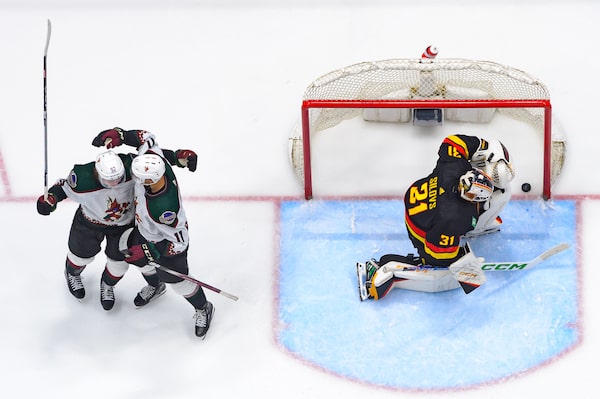
Dylan Guenther, #11 of the Arizona Coyotes, is congratulated after scoring a goal on Arturs Silovs, #31 of the Vancouver Canucks, during the third period of their NHL game at Rogers Arena on April 10 in Vancouver.Derek Cain/Getty Images
As Thomas Jefferson sort of said, the merchant of hockey has no country. As Wayne Gretzky kind of put it, you skate to where the puck money is going.
On Wednesday, multiple media outlets reported that National Hockey League sources had revealed plans for a possible move of the Arizona Coyotes to Salt Lake City. The franchise has long been on a cash-drip from the NHL’s other 31 owners, and their financial patience has its limits.
A quick geography refresher: Salt Lake City is not in Canada. Nor is it within commuting distance of Quebec City’s Centre Vidéotron, the 18,000-seat arena that Quebec taxpayers built a decade ago, for a cool $370-million, in the hope of catching the NHL’s eye.
It was a delusional hope. It was like buying a wedding dress, booking the chapel and purchasing non-refundable plane tickets for a honeymoon, in expectation of a proposal from someone who hasn’t given you the time of day, and is sporting engagement rings on each finger.
Quebec Finance Minister Eric Girard has referred to himself as the minister responsible for resurrecting the Quebec Nordiques – the maiden name of the team that married Denver, Colo., in 1995, becoming the Avalanche – but even he’s given up hope.
When journalists asked him what the news from Arizona meant for Quebec City, La Presse reports that he mostly talked about how he’s been very busy “suggesting” that the Montreal Canadians consider playing “one or more” regular-season games in la vielle capitale.
Good luck with that.
As I’ve written before, there’s enough money and fans to profitably support several more NHL franchises in Canada. The most logical site is Toronto. With more than 10 million people, the Greater Golden Horseshoe is the market where demand for hockey is the highest.
However, the NHL’s main interest is in growing its audience in unconquered parts of the U.S. Making new fans down there, rather than finding existing fans up here, is how to land a richer U.S. TV contract.
And in any case, the Toronto Maple Leafs surely don’t want another team in their backyard. Their local monopoly partly explains why Forbes ranks them as the NHL’s most valuable franchise, worth an estimated US$2.8-billion. Nor are the Montreal Canadiens (estimated worth: US$2.4-billion) eager to have a competitor in Quebec.
NHL revenue sharing also means that some of the money the most successful franchises make in Canada gets turned into subsidies for struggling U.S. teams. There’s not much interest in messing with that formula, either.
The NHL did allow one team to relocate to Canada in 2011, but it took the miracle – or from the NHL’s perspective, the disaster – of Georgia taxpayers freezing out the Atlanta Thrashers. There was no suitable U.S. buyer, and no suitable volume of local U.S. taxpayer subsidies, to be found on short notice. The happy result was the second coming of the Winnipeg Jets.
Quebec City needs that kind of miracle. Mr. Girard should consider prayer.
As for Phoenix, the league has worked hard to keep a team there because it’s one of the biggest U.S. cities, and growing fast. It’s America’s 13th largest combined statistical area, with more than 5 million people.
But the Coyotes have spent two decades bleeding money. The most recent chapter began in 2022, when they were evicted from their (taxpayer-provided) rink, and relocated to the hockey homeless shelter known as Mullett Arena. With just 4,600 seats, it’s a quarter the size of a typical NHL barn. That turned a money-loser into a welfare case.
The solution the league is reported to be working on is this: The franchise could be sold and moved to Utah, but with the current owner in Arizona possibly given the right to a future expansion team there – to be established once land (and don’t forget taxpayer support) is secured for a new arena.
If that’s the plan, it makes sense.
Ryan Smith, the potential buyer in Salt Lake, owns the NBA’s Utah Jazz. The Delta Center only seats around 14,000 for hockey, but that’s three times as many as Mullett Arena.
More importantly, Salt Lake City is likely to hold the 2034 Winter Olympics – which means taxpayers financing a newer, bigger facility to replace the Delta Center.
The elements are all there: A deep-pocketed owner said to be willing to buy the team and pay a movement fee; a serviceable arena; the near certainty of being gifted a new arena; and all in a Sunbelt market of 2.8 million people. That’s more people than Pittsburgh or Columbus, in a city that’s growing faster.
Assuming current Coyotes ownership or somebody else can assemble the land, resources and taxpayer dollars for a new arena, the league can return to Phoenix in a few years – without need to continue bleeding red ink at Mullett.
If and when another round of NHL expansion happens, it’s not hard to draw up the fantasy draft list. Houston and Atlanta, ahead of Phoenix, are the two biggest U.S. markets without an NHL presence. That a team has twice gone to Atlanta, and twice failed, is no barrier. It only underlines where the NHL believes financial opportunity lies.
South, not north.